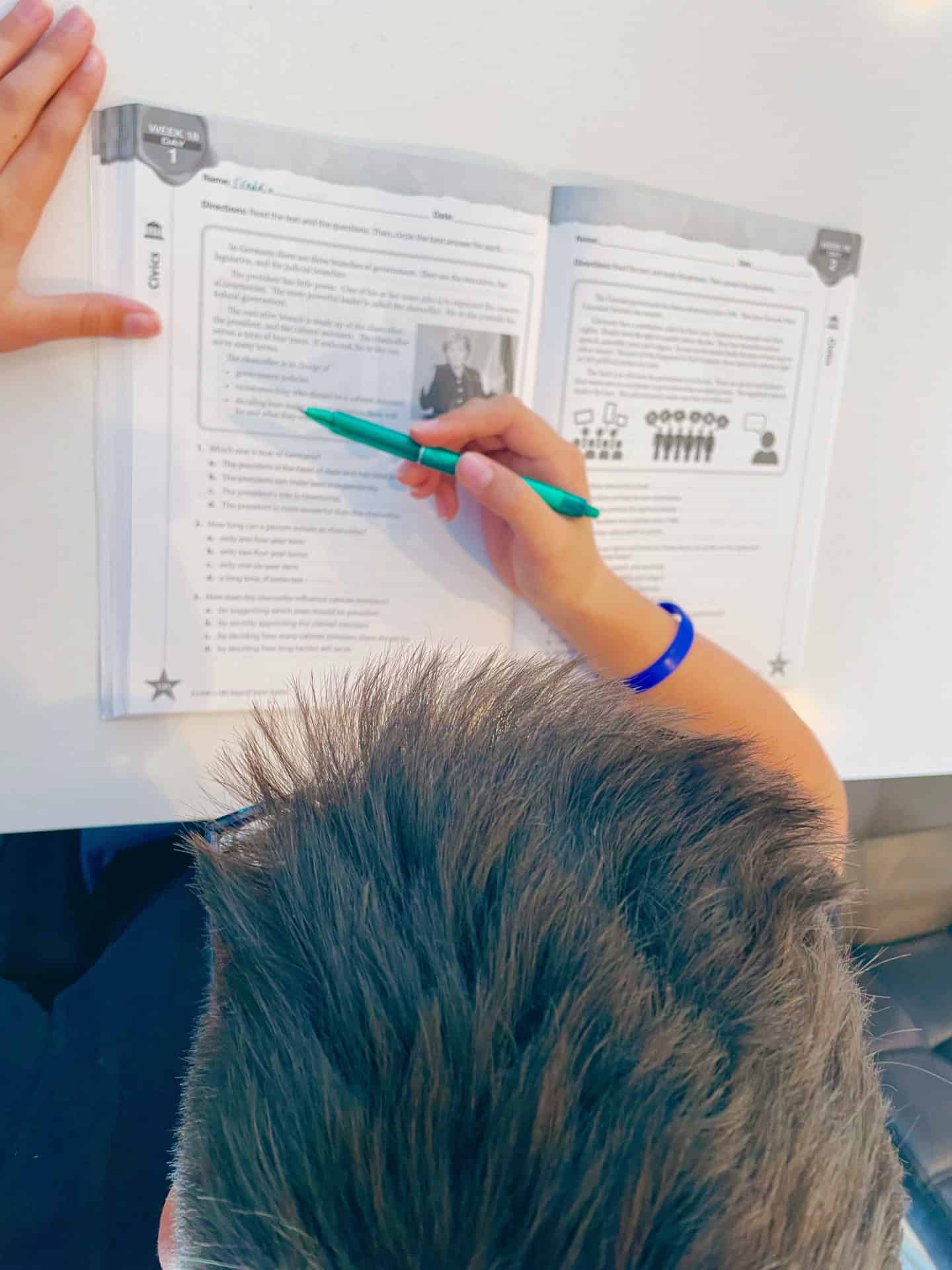Navigating Homeschool Civics Curriculum | A Guide
Homeschooling offers a unique and personalized educational journey for families, especially when it comes to teaching subjects like civics. Unlike the one-size-fits-all approach of public schools, homeschoolers can tailor their civics curriculum to match their values, learning styles, and interests. Let’s explore how to create a robust homeschool civics curriculum that engages and educates.
Civics isn’t just about memorizing the three branches of government; it’s about understanding citizenship, rights, responsibilities, and how to actively participate in society.
Civics can be taught through various homeschooling resources and methods, making it a dynamic and practical subject.

**This post may contain affiliate links. As an Amazon Associate and a participant in other affiliate programs, I earn a commission on qualifying purchases.**
Building a Foundation: Key Components of a Civics Curriculum
- Government Structure and Function
- Textbooks and Resources:
- American government curriculum high school
- Best social studies homeschool curriculum
- 180 Days of Social Studies: Grade 6 – Daily Social Studies Workbook
- The Infographic Guide to American Government
- Mark Twain Media Understanding the U.S. Constitution Workbook
- Scholastic’s Guide to Civics
- Mark Twain – U.S. Constitution Quick Starts Workbook
- Online Courses:
- Khan Academy: This is the best free homeschool curriculum, that features high-quality instructional videos and exercises on various civics topics.
- Crash Course: Engaging video lessons on U.S. government and politics, suitable for middle school to high school students.
- Programs like the HSLDA Online Academy offer high school-level civics courses that delve into American government, politics, and the Constitution.
- Textbooks and Resources:
- Historical Context
- Field Trips: Visiting local government buildings, historical sites, and museums can bring the subject to life. Many states have programs that allow homeschoolers to tour state capitol buildings and meet legislators. But even if you can’t get there in person you can have a virtual field trip!
- Primary Sources: Use documents like the Declaration of Independence, the Constitution, and Federalist Papers to help students understand historical context and develop critical-thinking skills.
- Citizenship and Civic Responsibility
- Service Projects: Encourage participation in community service projects to teach the importance of civic duty. This hands-on learning approach can be a powerful tool for understanding civic responsibility.
- Simulations and Role-Playing: Organize mock elections, debates, and legislative simulations to help students grasp the workings of government and the electoral process.
Customizing Your Civics Curriculum
One of the strengths of homeschooling is the ability to tailor the curriculum to fit your child’s homeschooling styles and interests. Here are a few tips on how to customize your civics curriculum:
- Learning Styles
- Visual Learners: Incorporate videos, infographics, and visual aids. Websites like Crash Course offer engaging video series on government and politics.
- Auditory Learners: Use podcasts and audio books. The “Civics 101” podcast is an excellent resource that covers a wide range of topics in an accessible format.
- Kinesthetic Learners: Include hands-on activities like building models of government structures or creating visual presentations on civic topics.
- Integrating Other Subjects
- Language Arts: Assign essays and research papers on historical events, influential figures, and Supreme Court cases to develop writing and research skills.
- Social Studies: Combine civics with geography to help students understand how different regions govern themselves and how local government fits into the larger picture.
- Mathematics: Analyze statistics from elections, census data, and other governmental reports to incorporate math skills.
- Diverse Perspectives
- Secular and Christian Homeschooling: Whether you prefer a secular homeschool curriculum or a Christian homeschool curriculum, there are plenty of resources available. For Christian homeschooling, textbooks from BJU Press or Sonlight offer civics education from a biblical perspective.
- Multicultural Education: Ensure your curriculum includes diverse perspectives by studying the contributions and roles of various cultural groups in American history and government.

Practical Tips for Teaching Civics at Home
- Use Technology: Leverage online platforms like iCivics, which offers free educational games and lesson plans designed to teach students about government and citizenship.
- Join Co-ops: Homeschool co-ops can provide group learning experiences, allowing students to engage in discussions and group projects about civics topics.
- Play Games:
- Stay Current: Incorporate current events into your lessons. Discussing recent news articles and how they relate to government and civic responsibilities can make the subject more relevant and engaging.
- Record Keeping and Transcripts: Keep detailed records of your child’s progress, including lesson plans, completed assignments, and extracurricular activities. This documentation is crucial for creating accurate transcripts for college applications.
Free Printable Worksheets
- Government worksheets
- Bill of Rights coloring pages
- If I were President activity
- US Presidents coloring pages
- Constitution coloring pages
- Election Day coloring pages
- Declaration of Independence printable
Addressing Common Concerns
- Socialization: Many worry that homeschooled children might miss out on socialization. Joining local homeschool groups, participating in community service, and engaging in extracurricular activities can mitigate these concerns.
- Standardized Testing and Accountability: Align your curriculum with state standards and prepare for standardized tests to ensure your child meets educational benchmarks. Utilize resources from organizations like the Home School Legal Defense Association (HSLDA) for guidance on legal requirements and best practices.
- College Preparation: Ensure your civics curriculum is rigorous and comprehensive to prepare your child for college-level courses. Incorporate advanced coursework, dual enrollment options, and AP courses where available.

Emphasizing the Importance of Civics
Civics education is crucial for developing informed and active citizens. In a homeschool environment, it provides the flexibility to dive deep into subjects, engage with the material in a hands-on manner, and foster a lifelong interest in governance and civic responsibility.
By utilizing a mix of textbooks, online resources, hands-on activities, and community involvement, homeschoolers can create a dynamic and effective civics curriculum that prepares students for the responsibilities of citizenship.
Homeschooling civics not only helps students understand their government and their rights but also empowers them to become proactive members of their communities. With the right resources and a tailored approach, homeschooling parents can instill a robust understanding of civics that will benefit their children for a lifetime.
Last Updated on 7 April 2025 by Clare Brown







